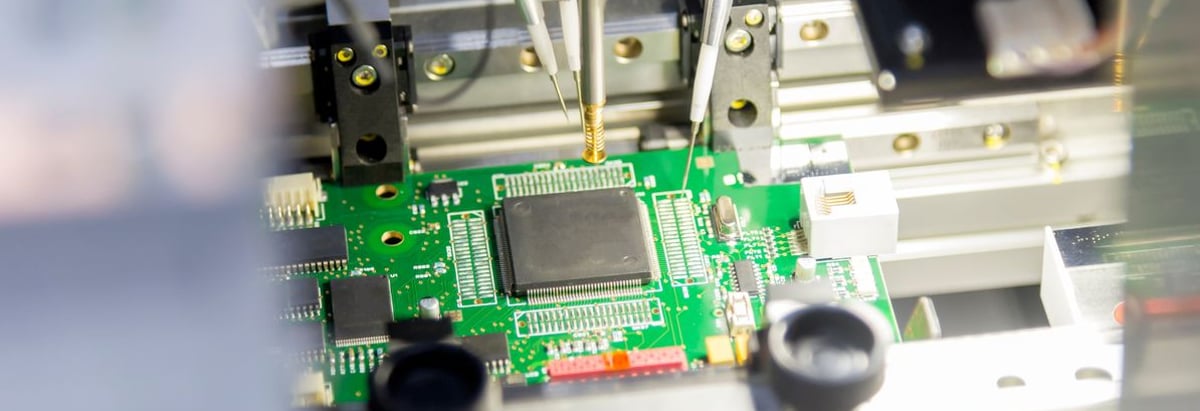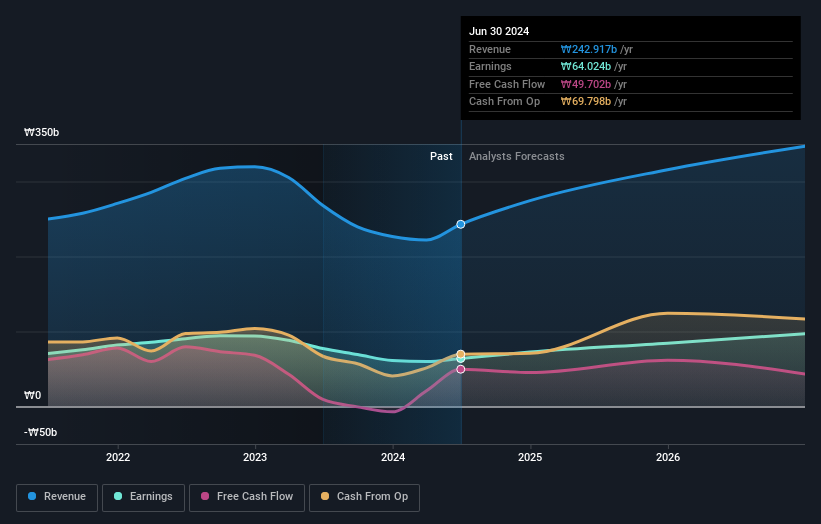- South Korea
- /
- Semiconductors
- /
- KOSDAQ:A064760
Both public companies who control a good portion of Tokai Carbon Korea Co., Ltd. (KOSDAQ:064760) along with institutions must be dismayed after last week's 7.9% decrease

Key Insights
- Significant control over Tokai Carbon Korea by public companies implies that the general public has more power to influence management and governance-related decisions
- Tokai Carbon Co., Ltd. owns 50% of the company
- Institutions own 21% of Tokai Carbon Korea
If you want to know who really controls Tokai Carbon Korea Co., Ltd. (KOSDAQ:064760), then you'll have to look at the makeup of its share registry. The group holding the most number of shares in the company, around 59% to be precise, is public companies. Put another way, the group faces the maximum upside potential (or downside risk).
While institutions, who own 21% shares weren’t spared from last week’s ₩85b market cap drop, public companies as a group suffered the maximum losses
In the chart below, we zoom in on the different ownership groups of Tokai Carbon Korea.
See our latest analysis for Tokai Carbon Korea

What Does The Institutional Ownership Tell Us About Tokai Carbon Korea?
Many institutions measure their performance against an index that approximates the local market. So they usually pay more attention to companies that are included in major indices.
As you can see, institutional investors have a fair amount of stake in Tokai Carbon Korea. This implies the analysts working for those institutions have looked at the stock and they like it. But just like anyone else, they could be wrong. It is not uncommon to see a big share price drop if two large institutional investors try to sell out of a stock at the same time. So it is worth checking the past earnings trajectory of Tokai Carbon Korea, (below). Of course, keep in mind that there are other factors to consider, too.

Hedge funds don't have many shares in Tokai Carbon Korea. Tokai Carbon Co., Ltd. is currently the largest shareholder, with 50% of shares outstanding. This essentially means that they have extensive influence, if not outright control, over the future of the corporation. In comparison, the second and third largest shareholders hold about 8.2% and 5.0% of the stock.
Researching institutional ownership is a good way to gauge and filter a stock's expected performance. The same can be achieved by studying analyst sentiments. Quite a few analysts cover the stock, so you could look into forecast growth quite easily.
Insider Ownership Of Tokai Carbon Korea
The definition of company insiders can be subjective and does vary between jurisdictions. Our data reflects individual insiders, capturing board members at the very least. Company management run the business, but the CEO will answer to the board, even if he or she is a member of it.
Insider ownership is positive when it signals leadership are thinking like the true owners of the company. However, high insider ownership can also give immense power to a small group within the company. This can be negative in some circumstances.
Our data cannot confirm that board members are holding shares personally. Not all jurisdictions have the same rules around disclosing insider ownership, and it is possible we have missed something, here. So you can click here learn more about the CEO.
General Public Ownership
With a 21% ownership, the general public, mostly comprising of individual investors, have some degree of sway over Tokai Carbon Korea. This size of ownership, while considerable, may not be enough to change company policy if the decision is not in sync with other large shareholders.
Public Company Ownership
It appears to us that public companies own 59% of Tokai Carbon Korea. It's hard to say for sure but this suggests they have entwined business interests. This might be a strategic stake, so it's worth watching this space for changes in ownership.
Next Steps:
It's always worth thinking about the different groups who own shares in a company. But to understand Tokai Carbon Korea better, we need to consider many other factors. Consider for instance, the ever-present spectre of investment risk. We've identified 1 warning sign with Tokai Carbon Korea , and understanding them should be part of your investment process.
If you are like me, you may want to think about whether this company will grow or shrink. Luckily, you can check this free report showing analyst forecasts for its future.
NB: Figures in this article are calculated using data from the last twelve months, which refer to the 12-month period ending on the last date of the month the financial statement is dated. This may not be consistent with full year annual report figures.
Valuation is complex, but we're here to simplify it.
Discover if Tokai Carbon Korea might be undervalued or overvalued with our detailed analysis, featuring fair value estimates, potential risks, dividends, insider trades, and its financial condition.
Access Free AnalysisHave feedback on this article? Concerned about the content? Get in touch with us directly. Alternatively, email editorial-team (at) simplywallst.com.
This article by Simply Wall St is general in nature. We provide commentary based on historical data and analyst forecasts only using an unbiased methodology and our articles are not intended to be financial advice. It does not constitute a recommendation to buy or sell any stock, and does not take account of your objectives, or your financial situation. We aim to bring you long-term focused analysis driven by fundamental data. Note that our analysis may not factor in the latest price-sensitive company announcements or qualitative material. Simply Wall St has no position in any stocks mentioned.
About KOSDAQ:A064760
Tokai Carbon Korea
Produces and sells various parts and components for the semiconductor, light emitting diode (LED), and solar industries in South Korea.
Flawless balance sheet with acceptable track record.
Market Insights
Community Narratives





